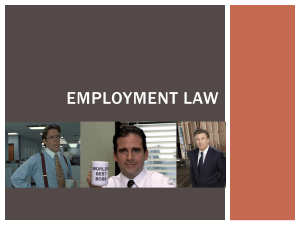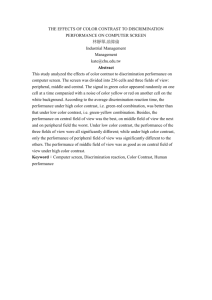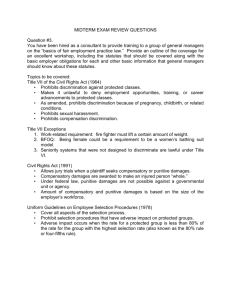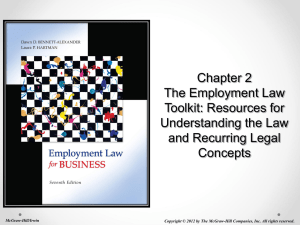employment law - University of Washington School of Law
advertisement
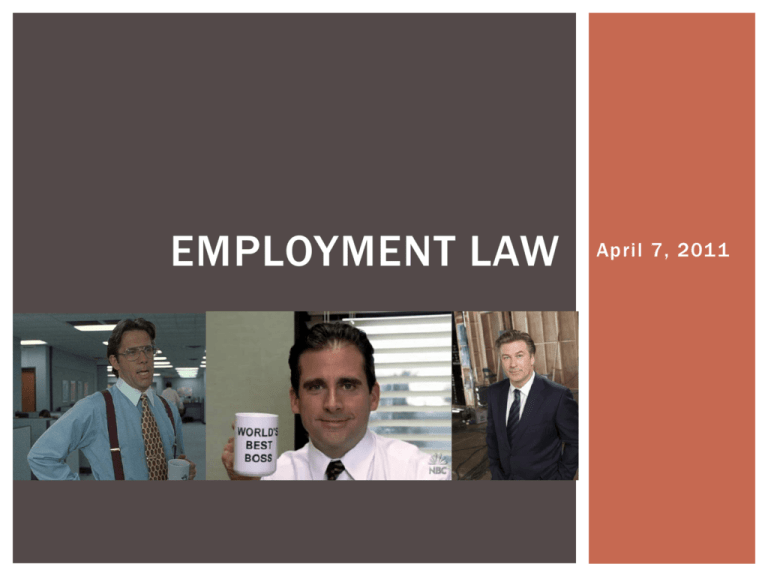
EMPLOYMENT LAW April 7, 2011 OVERVIEW OF TODAY The American System: Employment “at will.” Employee rights to privacy in “at will” system. Term contracts and “just cause.” Some exceptions to “at will” employment. Controverting public policy Discrimination EMPLOYMENT “AT WILL” About 50 percent of people aged 16-24 were employed for the month of July 2010. Who here has jobs? When you got your job, did you agree to work for a certain amount of time? In America, when you start working at a new job, there is typically no agreed upon length of time of the job. EMPLOYMENT “AT WILL” In jobs where you don’t have a specific amount of time for the job, the general rule is that your employer can fire you at any time, for any reason. EMPLOYMENT “AT WILL” Layoffs, downsizing, and outsourcing are all based on this principle: you can be fired for any reason at any time under most employment contracts. EMPLOYEE PRIVACY IN “AT-WILL” SYSTEM Two Employee Privacy topics: 1. What you do on your own time; 2. Drug testing. EMPLOYEE PRIVACY IN “AT-WILL” SYSTEM 1. Employer regulation of your free time. Case: Jim and Karen are dating. Karen leaves Dunder Mifflin to work for Staples. David Wallace tells Jim he needs to break up with Karen or be fired. Jim refuses to break up with Karen. David Wallace fires him. EMPLOYEE PRIVACY IN “AT-WILL” SYSTEM 1. Employer regulation of your free time. Can David fire Jim for dating Karen? Yes. EMPLOYEE PRIVACY IN “AT-WILL” SYSTEM 1. Employer regulation of your free time. What if David had told Jim not to date Pam, Jim’s coworker. Could David fire Jim for dating Pam? Yes. Patton v. J.C. Penney (Oregon 1986). EMPLOYEE PRIVACY IN “AT-WILL” SYSTEM 1. Employer regulation of your free time. What if, after Jim marries Pam, Jim has an affair with Leslie from Parks and Recreation. Can David fire him for that? Yes. Staats v. Ohio National Life Insurance (W.D. Pa. 1985). EMPLOYEE PRIVACY IN “AT-WILL” SYSTEM 1. Employer regulation of your free time. What if Jim walked into the office and found Michael having an affair with Erin, his secretary. Could David fire Jim for that? Yes. Hillenbrand v. Evansville (Ind. Ct. App. 1983). Could David fire Michael for that? Yes. Rogers v. IBM (1980). EMPLOYEE PRIVACY IN “AT-WILL” SYSTEM Other things employers can fire you for doing away from work: Volunteering at the AIDS foundation. Brunner v. Al Attar (1990). Going to night school. Scroghan v. Kraftco (1977). Smoking. Grusendorf v. Oklahoma City (1987). Smokers 34% more absenteeism, 40% more occupational injuries, 55% more disciplinary incidents. EMPLOYEE PRIVACY IN “AT-WILL” SYSTEM 2. Drug Testing In 2004, over 61% of major U.S. firms use drug testing. Drug-Free Workplace Act of 1988: Requires government employees and federal contractors to be drug free. Is this a violation of your privacy? Mixed treatment in the courts. In public jobs, the court relies on the Fourth Amendment to protect you. In private jobs, courts give a bit less protection. EMPLOYMENT AT WILL V. TERM CONTRACTS Most contracts are at-will. But a small percentage do have time “terms.” Employment Contracts At Will Term Contracts TERM CONTRACTS In 2005, Tyrone Willingham signed a five -year contract to coach the Washington Husky Football Team. In 2009, Jim Mora, Jr. signed a five -year contract to coach the Seattle Seahawks. In 2008, Don Wakamatsu signed a four-year contract to manage the Seattle Mariners. Mora signed 5-year contract in January 2009. But in January 2010, only one year later… TERM CONTRACTS All three were fired before the end of their contracts. TERM CONTRACTS Only two ways you can fire a coach (or anyone else with a term contract) before the end of the term: 1. For “just cause.” 2. By “buying them out” and paying them as if they were still coaching/working. TERM CONTRACTS: JUST CAUSE If you have a term contract, you can be fired only for “just cause.” Basically means the employee is doing very unreasonably unsatisfactory work quality and work behavior. TERM CONTRACTS What is “satisfactory work?” Four factors: Regular attendance; Obedience to reasonable work rules; Reasonable quantity and quality of work; Avoidance of conduct that hurts employer’s business. TERM CONTRACTS Were these firings for “just cause?” Huskies were 0-12. Seahawks were 5-11. Mariners ended up losing 100 games. Still, none were for just cause. TERM CONTRACTS Instead, all three coaches were “bought out.” EMPLOYMENT AT WILL V. TERM CONTRACTS Employment Contracts At Will Term Contracts EXCEPTIONS TO “AT WILL” Again, general rule: okay to fire you any time for any reason. There are a few ways your employer cannot fire you: If the reason for your firing contravenes public policy; or If the firing is discriminatory. EXCEPTIONS TO “AT WILL” 1. If the reason for your firing contravenes public policy. Case #1: Fulfilling a public obligation: jury duty EXCEPTIONS TO “AT WILL” Case #1: Jury Duty Liz Lemon gets called for jury duty. Jack tells her she can’t be gone for jury duty. He tells her to dress up like a crazy person and get out of it. “Do whatever it takes to get out of jury duty. If you don’t get out of that jury, you’re fired.” Liz tries, but gets selected for the jury. Can Jack fire her? No. Nees v. Hocks (Or. 1975). EXCEPTIONS TO “AT WILL” 1. If the reason for your firing contravenes public policy. Case #2: Committing an illegal act: EXCEPTIONS TO “AT WILL” Jack tells Kenneth he needs to phone in a death threat to President Obama. Kenneth knows this is a federal crime with huge penalties. Jack tells Kenneth he has to do it anyway or Jack will fire him. Kenneth still refuses and Jack fires him. Can Jack do that? No. Johnson v. Del Mar Distributing. EXCEPTIONS TO “AT WILL” 2. If the reason for the firing is discriminatory. EXCEPTIONS TO “AT WILL”: DISCRIMINATION Several federal statutes prohibit discrimination in employment. Title VII of the Civil Rights Act of 1964. Civil War Reconstruction Statutes. The Age Discrimination in Employment Act of 1967 (ADEA). Americans with Disabilities Act of 1990 (ADA). Ferdie EXCEPTIONS TO “AT WILL”: DISCRIMINATION Statutes bar discrimination on the basis of: Race National origin Ethnicity Religion Gender Age Disability EXCEPTIONS TO “AT WILL”: DISCRIMINATION 1. “Individual discriminatory treatment” Case #1: Sven the Dane Sven, a mechanic for Boeing, gets laid off. He thinks he was laid off because he was Danish. He reapplies for the job. He thinks he’ll get it because he is qualified. He doesn’t get it. The job remains open. Boeing hires Ole, a Norwegian. EXCEPTIONS TO “AT WILL”: DISCRIMINATION 1. “Individual discriminatory treatment” Case #1: Sven the Dane Sven sues Boeing. He claims he was passed over because of his ethnicity. Boeing claims it didn’t hire Sven because of his criminal record of stealing from employers. Sven thinks this reason is a pretext. EXCEPTIONS TO “AT WILL”: DISCRIMINATION 1. “Individual discriminatory treatment” Case #1: Sven the Dane Must show he was passed over and was qualified. Employer can respond with other reason. Sven can then prove pretext. “You dumb dirty Dane.” McDonnell-Douglas v. Green. EXCEPTIONS TO “AT WILL”: DISCRIMINATION 2. “Systemic Disparate Impact.” When an employer has a policy in place that, while looking neutral on its face, has a disparate impact on races, genders, or religious persons. EXCEPTIONS TO “AT WILL”: DISCRIMINATION 2. Systemic Disparate Impact. Case #2: The Degree Requirement Seattle City Light has huge crews of people who dig ditches. The only real requirement for this job is to be good with a shovel. But Seattle City Light requires ditch -diggers to have a college degree, even though it is unrelated to ditch -digging. This results in only Norwegians working on these crews and no Danes. EXCEPTIONS TO “AT WILL”: DISCRIMINATION Systemic Disparate Impact. The Danes sue. Seattle City Light says it’s always had this requirement and certainly doesn’t have it in place to discriminate against Danes. What result? EXCEPTIONS TO “AT WILL”: DISCRIMINATION 2. Systemic Disparate Impact Griggs v. Duke Power (1971). Doesn’t matter what company’s intent was. If you have a test or other requirement that creates a disparate impact, you have to have a business necessity for doing so. The test must be related to the job. Degree requirement not related to ditchdigging. EXCEPTIONS TO “AT WILL”: DISCRIMINATION 3. Sexual harassment and sex discrimination Case #3: Quid Pro Quo Elle Woods works at a law firm. The partner who runs the firm makes unwelcome sexual advances to Elle. He tells her she will be promoted if she has sex with him, and he’ll fire her if she doesn’t have sex with him. Can he do that? No. EXCEPTIONS TO “AT WILL”: DISCRIMINATION 3. Sexual Harassment. Later, Elle Woods is at work at the law firm, and many of the men are being gross. They aren’t coming onto her or demanding sexual favors. But they are making a lot of misogynistic remarks, telling terrible jokes about women, and being very graphic in talking about sex and women they’d like to “score” with. Is this sex discrimination that Elle can sue over? Yes. EMPLOYMENT LAW REVIEW PROBLEM Tiger Woods and his ex -wife, Elin Woods, have separated and divorced after revelations of Tiger’s infidelity. Elin has moved to Seattle and gotten a job as a server at Top Pot donuts, the greatest restaurant in the history of the world. She did not agree upon any specified amount of time in accepting the job. Her manager, a deeply moral person who doesn’t believe in divorce, learns that Elin is a divorcee. She immediately fires Elin. Can she do that? Yes. (cases we cited on Thursday). EMPLOYMENT LAW REVIEW PROBLEM Tiger had an endorsement deal with Dick’s hamburgers to serve as spokesperson. The deal was set for $1 million per year for four years. The contract allowed Dick’s to end the agreement unilaterally “for cause” but did not explain what circumstances could count as “cause.” After Tiger’s many sexual af fairs were revealed publicly, Dick’s ended the agreement in the second year, claiming it ended the contract “for cause.” Dick’s would have owed Tiger $2 million for the next two years. Does Tiger’s personal infidelity count as “cause” for firing? Should Dick’s have to “buyout” Tiger’s contract? EMPLOYMENT LAW REVIEW PROBLEM Tiger decides to take a year off from golf and work as an instructor at the Green Lake Pitch and Putt. He applies for the job. He is, quite obviously, very qualified to be a golf instructor. He is passed over the for the job, and the course hires Annika Sorenstam, a famous female golfer, instead. Tiger has a hunch that he was passed over because he’s a man, but he has no proof. The golf course says it hired Annika because she has a better short game and is thus more qualified. If Tiger has no other proof, can he win his case for sex discrimination? What if he finds out that only women work at the course? What if he finds out that the female manager runs a sexist blog that includes crude epithets against men? EMPLOYMENT LAW REVIEW PROBLEM After being fired from Top Pot, Elin decides to try her hand at being a bouncer. She applies to be a bouncer with the company that owns several bars in Seattle, including the Little Red Hen. Upon filling out the application, she finds a job requirement that “all applicants be at least 6’ 3” tall.” She does her research and finds that, because of this height requirement, all the company’s bouncers are men. The company claims it has no bias against women, it just wants tall people as bouncers. Can she sue for disparate impact sex discrimination?

